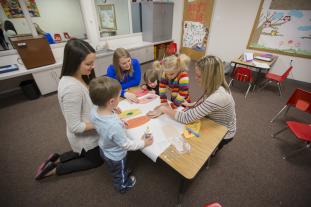Pyramid Model for Early Childhood Education


Data Tools
Challenging behavior is an issue for many young children. Approximately 10% to 15% of typically developing preschoolers have behavior problems when they enter kindergarten. Therefore, promoting positive social-emotional competence in all children and intervening before social-emotional difficulties spiral out of control is important for children to be successful from the very beginning.
Related Briefs
Outside Resources
Information and Resources to Assist States in Developing Policy on Early Childhood Suspension and Expulsion
High-quality preschool lays the foundation for a child’s educational career. Preschool is where children are learning how to self-regulate, make friends, communicate, and express their wants and needs while preparing for their educational career within the K-12 system. If children do not have the behavioral and social-emotional skills needed to effectively participate in preschool programs, they are missing critical opportunities to grow and learn. Teachers and parents are often the “first responders” to address challenging behaviors and need knowledge, resources and support to nurture positive social-emotional development as a foundation of learning. This report includes resources to inform early childhood stakeholders at the state and local level interested in developing policy and guidance for programs to prevent and reduce suspension and expulsion.
Ceelo Policy ReportEvery year, as many as 8,710 3- and 4- year-old children may be expelled from or pushed out of their state-funded preschool or prekindergarten classroom.
Standing Together Against Suspension & Expulsion in Early ChildhoodThe Pyramid Equity Project
This document addresses problems with suspending and expelling preschool aged children, the federal response to this problem, and how to take action.